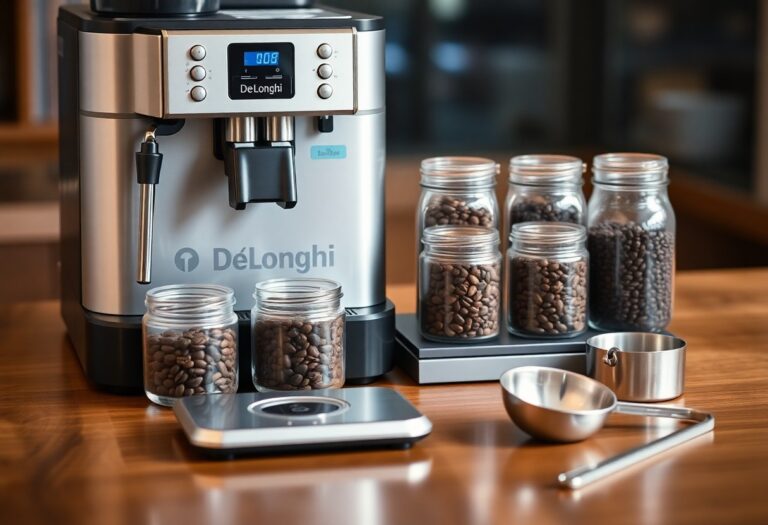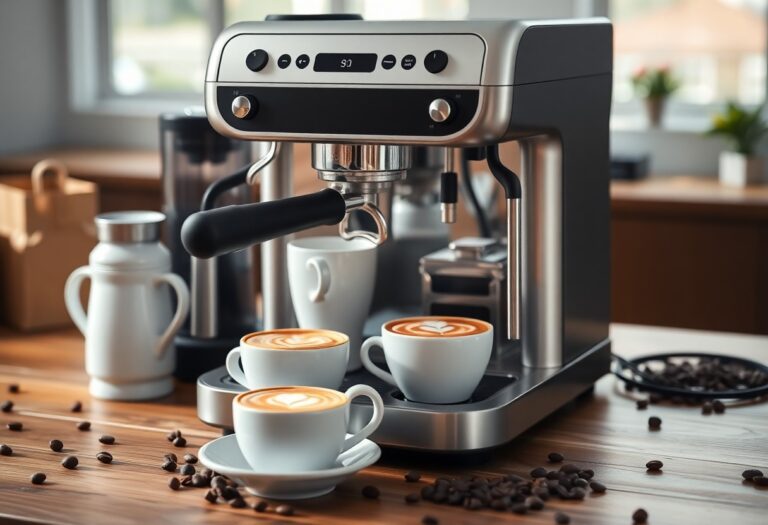What is Wrong with My DeLonghi Coffee Machine – Troubleshooting
You may find yourself facing issues with your DeLonghi coffee machine that can disrupt your daily caffeine fix. Whether it’s an annoying leak, strange noises, or inconsistent brewing, these problems can be frustrating. However, with some simple troubleshooting steps, you can diagnose and possibly fix many common issues. Our guide will help you identify potential problems and explore effective solutions, ensuring you can enjoy your perfect cup of coffee without delay. Don’t let these hiccups ruin your morning ritual – let’s get your machine working smoothly again!
Key Takeaways:
- Check the water reservoir to ensure it is filled and properly seated in the machine.
- Inspect the coffee grounds and adjust the grind size if the coffee is too weak or too bitter.
- Clean the machine regularly, including the brew group and any detachable parts, to ensure optimal performance.
- Look for error messages on the display, as they can provide specific guidance on issues that need addressing.
- Verify the power supply and connections if the machine fails to turn on or exhibits electrical problems.
Identifying the Most Frequent Issues
Understanding the common issues your DeLonghi coffee machine may face can help you resolve problems swiftly. Many users report similar complaints, from water leakage to irregular brewing cycles. Recognizing these issues early will not only save your machine but also ensure your coffee remains flavorful and consistent.
Common Problems That Can Arise
Several issues frequently affect DeLonghi coffee machines, including clogged filters, inconsistent temperature, and grinding malfunctions. You might also encounter water leaks or strange noises during operation. Addressing these problems promptly can prevent more extensive damage and keep your machine performing optimally.
Initial Symptoms to Observe
Being alert to initial symptoms can guide you in diagnosing your coffee machine’s problems. Signs such as slow brewing, off-taste espresso, or strange sounds can indicate underlying issues. Taking note of these irregularities will help you determine whether it’s a simple fix or if professional assistance is required.
For example, if you notice a slow brewing process, this may point to a blocked water path or a sales-associated clog. If your espresso lacks the rich flavor you expect, it might be time to clean or replace filters or consider beans that are fresher. Being proactive by observing these initial symptoms will benefit the longevity and performance of your DeLonghi coffee machine.
Decoding Error Messages and Indicator Lights
Error messages and indicator lights on your DeLonghi coffee machine serve as vital communication tools, guiding you toward identifying and resolving issues. Understanding the specific flashes or alerts can lead to efficient problem-solving and restore your coffee-making ritual quickly. The key is to pay attention to these notifications, as they often reflect fundamental issues that, when addressed, can prevent further complications.
What Your Machine Is Trying to Tell You
Your DeLonghi coffee machine uses a series of error codes and indicator lights to inform you about its operational status. For example, a steady or blinking water tank light may indicate that the reservoir is empty or improperly installed. Similarly, a flashing coffee cup icon can suggest that the brewing process is interrupted. These signals guide your troubleshooting efforts and ultimately enhance your machine’s performance.
Troubleshooting Specific Error Codes
Specific error codes can indicate various issues with your DeLonghi coffee machine, from minor inconveniences to significant malfunctions. If you encounter an error message such as “E61” or “E70,” addressing them promptly is important for maintaining your device’s health. Look up your machine’s manual for detailed explanations of the error codes, which often include troubleshooting steps tailored to each issue.
Troubleshooting specific error codes typically involves first identifying the meaning behind the code displayed. For instance, an “E61” error often points to a problem with the thermoblock, suggesting that it may need resetting or descaling. Alternatively, an “E70” error is indicative of a malfunction in the pressure sensor, requiring inspection of internal components. Once you know the code, refer to the user manual or online resources for tailored troubleshooting steps, which may involve simple maintenance tasks or recommended service.
Maintenance Hacks to Prevent Future Problems
Taking a proactive approach to your DeLonghi coffee machine’s upkeep will save you from unexpected breakdowns and enhance your daily coffee experience. Simple maintenance routines, like regular descaling and replacing old filters, can significantly extend the lifespan of your machine. Setting up a schedule for these tasks ensures that your equipment runs efficiently, so you can enjoy rich, smooth brew every morning without interruptions.
Simple Regular Care Techniques
Incorporate simple daily habits into your routine to keep your machine in top shape. Always clean the brew group regularly; remove and rinse it under warm water, letting it air-dry before reinserting. Additionally, wipe down the exterior with a soft cloth and check for any coffee residue around the spouts and compartments to prevent buildup, which can affect taste and performance.
Timely Deep Cleaning Strategies
Periodically deep cleaning your DeLonghi coffee machine is crucial to prevent operational issues. Every few months, perform a thorough cleaning of the water reservoir and internal components using vinegar or specialized solutions designed for coffee machines. It’s advisable to refer to your user manual for specific deep cleaning cycles—timely maintenance often catches build-up before it becomes a problem.
Deep cleaning involves several key steps to ensure all parts function optimally. Start by emptying and rinsing the water tank and drip tray. Use a solution of equal parts water and vinegar to clean the interior pathways; run a brew cycle without coffee grounds to flush out any lingering oils or residue. This deep clean should ideally occur every 3-6 months, depending on usage. Following these steps will help maintain the flavor of your coffee while preventing clogs and other performance issues.

When to Call for Professional Help
If you encounter persistent issues with your DeLonghi coffee machine despite troubleshooting efforts, it may be time for professional intervention. Problems such as strange noises, leaks, or repeated error messages indicate underlying issues that require expert attention. Consider seeking help from a certified technician who specializes in espresso machines to ensure a thorough examination and repair. For a deeper understanding of coffee machine maintenance, you can explore resources like Manual Espresso Machines: How To and Troubleshooting.
Signs Your Coffee Machine Needs Expert Attention
Look out for signs that your coffee machine might require professional help. If your machine is leaking water, making unusual noises, or producing inconsistent coffee quality, these are red flags. Additionally, persistent error codes that don’t resolve with standard troubleshooting techniques suggest there is a deeper problem at play. Ignoring these issues can lead to more significant damage, so addressing them promptly is in your best interest.
How to Choose a Qualified Repair Technician
Selecting the right repair technician is vital for ensuring a successful repair of your DeLonghi coffee machine. Start by looking for individuals or services with certifications specific to espresso machines. Reading reviews and testimonials can also provide insight into their expertise and reliability. A technician who offers a warranty on their repairs and uses genuine DeLonghi parts is a strong indicator of quality service. Lastly, ensure they have experience with your specific model, as this familiarity can lead to a quicker, more efficient repair process.
When searching for a qualified repair technician, don’t hesitate to ask for recommendations from local coffee shops or online forums dedicated to coffee enthusiasts. Look for technicians who have positive feedback and proven experience with your specific DeLonghi model. Verifying their credentials and ensuring they have access to the necessary replacement parts will not only expedite the repair process but also enhance the longevity of your coffee machine. A well-repaired machine means you can enjoy your favorite coffee without any hindrances.

User Experiences: Learning from Personal Stories
Many coffee enthusiasts share experiences that resonate with your own challenges, revealing practical insights into troubleshooting your DeLonghi coffee machine. From issues with inconsistent brewing temperatures to clogged frothing wands, users describe their methods for pinpointing problems quickly. These stories prove invaluable as you learn from their trials and successes, making your journey to a perfectly brewed cup all the more enriching.
Real-Life Solutions from Fellow Coffee Lovers
Online forums and communities dedicated to coffee lovers reveal a treasure trove of solutions. For instance, one user found that regularly descaling their DeLonghi not only improved the taste of their coffee but also prevented clogging and overheating. Another suggested using filtered water to significantly reduce mineral buildup, making maintenance simpler. These practical solutions often come with supportive guidance, which you can easily implement.
Lessons Learned and Best Practices Shared
Coffee lovers have identified several best practices to ensure a longer lifespan for your DeLonghi machine. Regular cleaning and descaling, for instance, are often cited as the most effective strategies. Users recommend a simple routine of daily maintenance, alongside using high-quality coffee beans and filtered water, which can drastically improve your brewing experience. Keeping your machine’s parts clean and checking for wear and tear before troubleshooting are fundamental steps that seasoned coffee aficionados swear by.
This ongoing dialogue among coffee lovers highlights the value of sharing knowledge. By establishing a consistent cleaning routine, you prolong your machine’s functionality. Many users recommend scheduling descaling every three months, depending on water hardness and frequency of use. Keeping your coffee machine in optimal condition while embracing the community’s empathy and support can transform your coffee-making experience into one of joy rather than frustration. Engaging with fellow enthusiasts can inspire you to adopt best practices that simplify your daily rituals and maximize your coffee enjoyment.
Conclusion
On the whole, troubleshooting your DeLonghi coffee machine can be a straightforward process when you understand common issues and their solutions. By identifying symptoms like inconsistent brewing, unusual noises, or error messages, you can often resolve problems before they escalate. Regular maintenance, such as cleaning and descaling, will help ensure your machine operates smoothly. Should you encounter persistent issues beyond your DIY fixes, seeking professional repair services may be your best option. Your enjoyment of coffee should never be compromised, so take proactive steps to keep your DeLonghi in top shape.
FAQ
Q: Why is my DeLonghi coffee machine not brewing coffee?
A: If your DeLonghi coffee machine is not brewing coffee, there could be several reasons for this. First, ensure that the water reservoir is filled and properly seated. Check if the coffee grounds are packed too tightly or if the filter is clogged. If it’s an espresso machine, verify that the portafilter is locked in place correctly. Additionally, cleaning the machine and descaling it regularly can help avoid clogs that hinder brewing.
Q: What should I do if my DeLonghi coffee machine is leaking water?
A: A leaking DeLonghi coffee machine can be caused by several factors. First, check the water reservoir for cracks or if it’s not properly seated. Inspect the brew unit and ensure it’s correctly positioned. Look for any wear on seals or gaskets, as these can deteriorate over time. If the machine is still leaking, try descaling it, as built-up mineral deposits can cause irregularities leading to leaks.
Q: Why does my DeLonghi coffee machine produce weak coffee?
A: If the coffee produced is weak, it may be caused by insufficient coffee grounds used. Most machines have a recommended amount for optimal brewing. Additionally, check the grind size of the coffee; if it’s too coarse, the water might pass through too quickly. Also, ensure that the machine is set to the correct strength setting and that it is clean, as old residues can affect the flavor.
Q: My DeLonghi coffee machine makes strange noises while brewing. What could be the issue?
A: Strange noises during brewing can be indicative of air in the system or a mechanical issue. First, check the water reservoir and ensure it’s filled properly. If there are any clogs or blockages in the system, they can cause irregular sounds. Make sure the machine has been descaled if it has not been done recently. If the noise persists, it may be beneficial to have a professional inspect the machine to prevent further damage.
Q: How can I fix my DeLonghi coffee machine if it won’t turn on?
A: If your DeLonghi coffee machine is not powering on, start by ensuring that it is plugged in and that the outlet is functioning. Check the power cord for any visible damage. If the machine has a reset option, try that as well. Sometimes, internal fuses can blow; consult your user manual for guidance on checking for and replacing any blown fuses. If the machine still doesn’t turn on after these steps, contacting customer support for professional assistance may be necessary.







